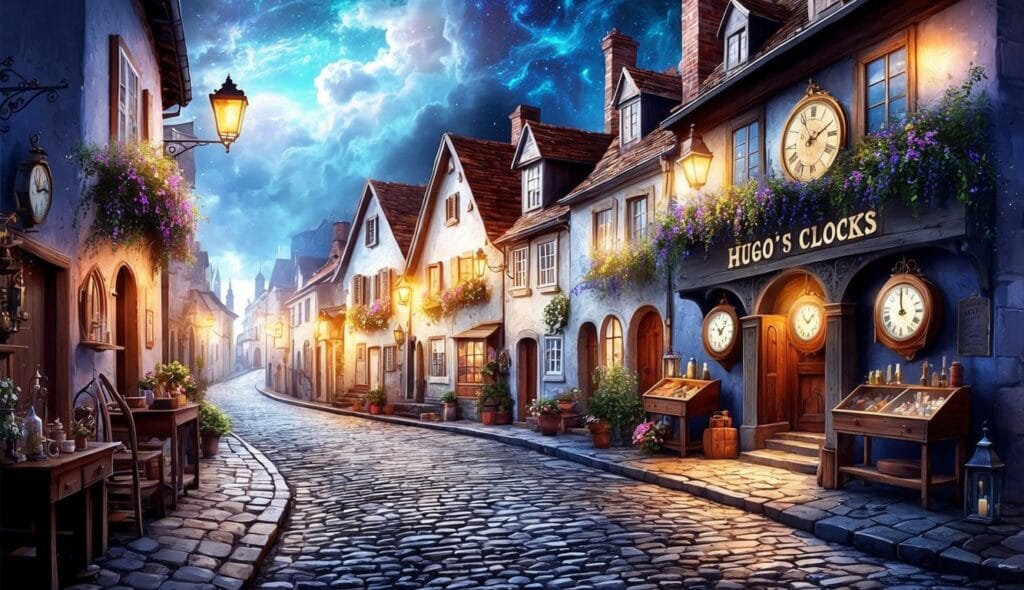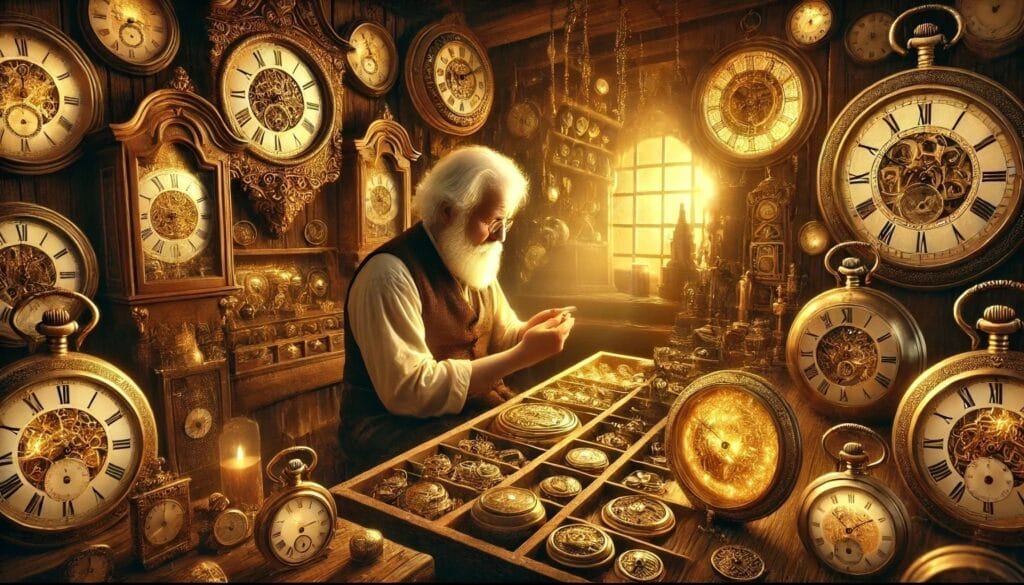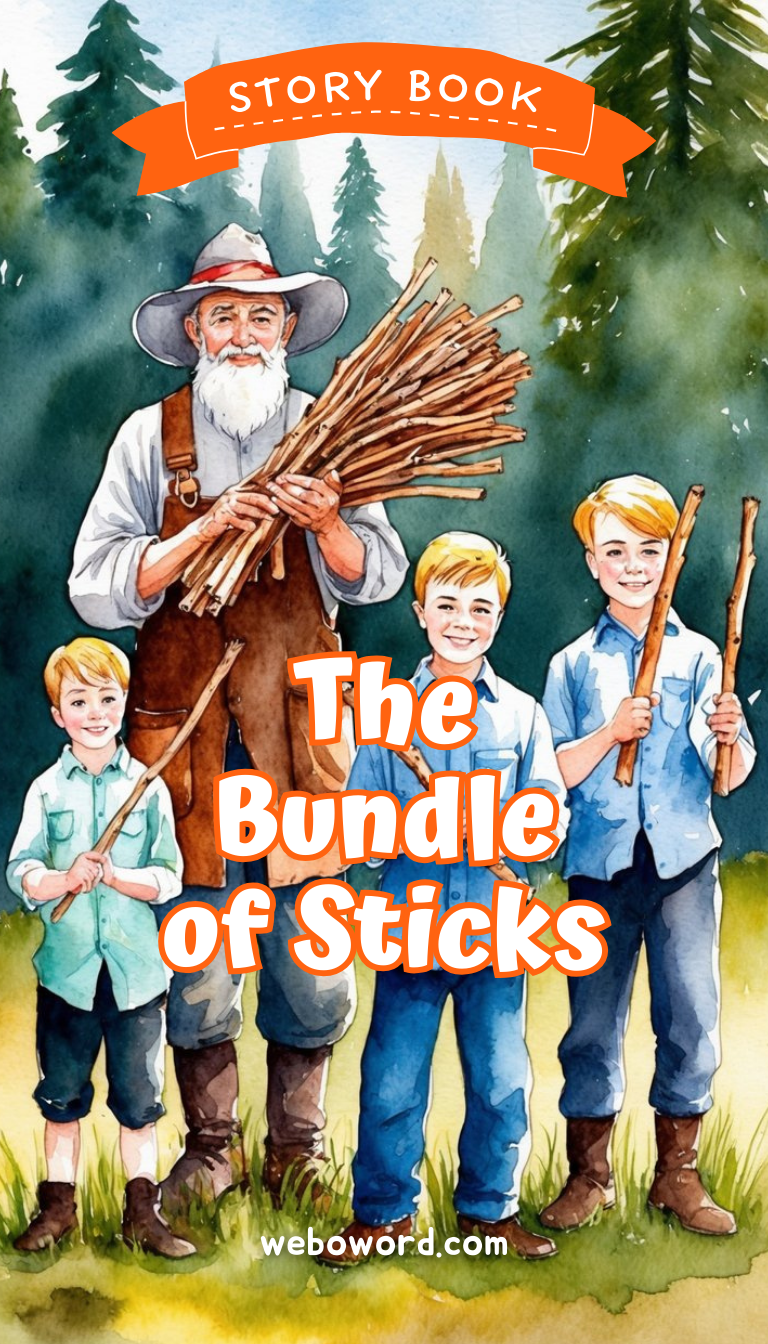In the heart of an old town, where cobblestone streets twisted and turned through rows of quaint houses, there was a small workshop with a wooden sign above its door that read, “Hugo’s Clocks.”
The shop was owned by an aging clockmaker named Hugo, known for his delicate craftsmanship and the comforting tick-tock of his clocks, which could be heard from down the street. Hugo had spent decades creating clocks of every shape and size—grandfather clocks, pocket watches, and everything in between.

One winter evening, as a light snow began to fall, Hugo sat in his workshop, bent over his latest creation. His fingers moved deftly, adjusting gears and springs, though his eyes bore the gentle wear of age.
This clock was unlike any other he had ever made. Its face was a soft gold, and its hands moved with an elegant slowness that seemed almost magical. It was a gift, a special creation meant for someone who needed it.
The bell above the shop door jingled softly, and Hugo looked up to see a familiar face. It was Thomas, a young man from the town, who often visited Hugo’s shop.
Thomas worked long hours in the city, always rushing from one thing to the next, and the weight of his responsibilities seemed to have settled in the lines of his face.
“Evening, Mr. Hugo,” Thomas said, offering a tired smile.
“Good evening, Thomas,” Hugo replied, his eyes twinkling. “I’ve just finished something I think you might find interesting.”
Thomas raised an eyebrow as Hugo stood, walking over to a wooden shelf where the golden clock sat, glimmering in the soft light of the workshop.
Hugo picked it up carefully and handed it to Thomas.
“This,” Hugo said, “is not just any clock. It can pause time, for just a few minutes each day. Enough to give you a moment of stillness when you need it most.”
Thomas blinked, unsure if the old man was serious. “Pause time?” he repeated, turning the clock over in his hands.
Hugo nodded. “When the world feels like it’s moving too fast, when you feel overwhelmed—just press this button here.” He pointed to a small, discreet button on the side of the clock. “And for a few minutes, everything will stop. You’ll have time to breathe, to see, to feel.”
Thomas was skeptical, but there was something about the warmth in Hugo’s eyes that made him believe. He thanked the old clockmaker and left the shop, the golden clock tucked carefully in his coat pocket.
The next morning, Thomas awoke to the usual rush of his alarm. He hurried through his morning routine, barely tasting his coffee as he prepared for another busy day. He had almost forgotten about the clock until he felt it, a weight in his pocket, as he was about to leave his apartment.
On an impulse, Thomas decided to try it. He pressed the small button on the side of the clock and, to his amazement, the bustling sounds of the city outside his window fell silent.
The ticking of his wall clock stopped, mid-tick. Even the sunlight streaming in through the curtains seemed to hold still, casting golden beams that didn’t waver.
For the first time in what felt like years, Thomas took a deep breath—truly took it in, feeling the air fill his lungs. He looked out the window at the frozen world, the people on the street below caught mid-step. There was something beautiful in the stillness, something calming that made him feel as though he had all the time in the world.
The weight on his chest seemed to lift, and for those precious moments, he was free.
When the clock’s magic faded and time resumed, Thomas felt different. He wasn’t in a rush. He left his apartment with a calmness he hadn’t known he needed.
Over the following weeks, Thomas used the clock often. He paused time to watch the sunrise one early morning, the sky slowly shifting from inky blue to brilliant orange and pink. He paused it again one afternoon, sitting by the river that ran through the town, listening to the gentle lapping of water against the stones. He paused it during a visit to his mother’s house, watching her laugh as she recounted an old family story, the lines around her eyes deepening with joy.
Each time, Thomas found himself noticing things he had long overlooked—the way the light danced on the surface of the water, the softness in his mother’s voice, the warmth of a winter sun. He realized that these moments, these small, quiet joys, were what he had been missing in his endless rush to keep up with life.
One evening, Thomas found himself back at Hugo’s shop. He wanted to thank the old man for the gift, to tell him how it had changed his life. The bell above the door chimed as he entered, and Hugo looked up from his workbench, smiling warmly.
“Ah, Thomas,” Hugo said. “How have you found the clock?”
Thomas smiled, pulling the golden timepiece from his pocket. “It’s wonderful,” he said. “I’ve used it to pause so many beautiful moments. But… I think I’m beginning to understand something.”
Hugo nodded, as though he already knew what Thomas was about to say.
“I don’t think I need it anymore,” Thomas continued. “I mean, I still love it. But I’ve started finding those moments without needing to stop time. I’ve started noticing them on my own.”
The old clockmaker’s eyes twinkled, and he reached out, taking the clock from Thomas’s hands. “That,” Hugo said softly, “is the true gift. Time is always moving, but we don’t need to pause it to find peace. We just need to remember to look.”
Thomas nodded, feeling a deep sense of gratitude. He left the shop that evening without the clock, but with something far more valuable—a new understanding of time, of life, and of the beauty that could be found in the smallest of moments.
From that day on, Thomas continued to find moments of stillness. He would pause during his walks to feel the breeze against his skin, would linger a little longer at the river to watch the ducks gliding across the surface. He took time to savor the laughter of friends, to enjoy the warmth of a cup of tea, to simply be.
And though time never stopped, it didn’t feel like it needed to. Because Thomas had learned that the true magic wasn’t in pausing time—it was in the way he chose to live within it.
As the seasons changed, the snow giving way to the first blossoms of spring, Thomas often thought of Hugo and his gift.
The clockmaker had given him more than just a way to pause time; he had given him the ability to truly appreciate the moments that made up his life.
And in a world that always seemed to be rushing forward, that was a gift beyond measure.
The clock sat in Hugo’s shop window, waiting for the next person who might need it—a gentle reminder that sometimes, all we need is a moment to breathe, to see, to feel. And that those moments are always there, waiting, if only we remember to look.




